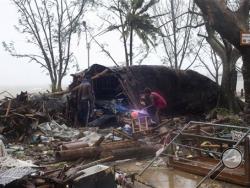Massive cyclone ravages Pacific island nation
Posted: March 14, 2015 - 3:49am
WELLINGTON, New Zealand (AP) -- Many residents in cyclone-ravaged Vanuatu were forced to hunker a second night in emergency shelters after venturing out Saturday only to find their homes damaged or blown away, according to aid workers.
Power remains out across the tiny Pacific archipelago and people on many of the outer islands have no access to running water or outside communications, said Chloe Morrison, a World Vision emergency communications officer in the capital of Port Vila.
Cyclone Pam tore through the islands early Saturday, leaving a trail of destruction and unconfirmed reports of dozens of deaths.
Morrison said communications have been so problematic that her aid group hasn't yet been able to account for many of its own 76 staff on the islands and authorities have been unable to assess the extent of the damage.
"I can say that for anybody who wasn't in a secure shelter last night, it would have been a very, very tough time for them," she said.
She said authorities did a good job Friday moving thousands of people in Port Vila into 23 evacuation centers. She said with the winds and rain easing Saturday many people stepped out only to find their homes were missing a roof or had disappeared and so were forced to return to the shelters.
She said teetering trees and downed power lines in Port Vila have made many areas hazardous. She said she's hearing reports of entire villages being destroyed in more remote areas.
"It's still really quite dangerous outside. Most people are still hunkering down," she said.
U.N. Secretary General Ban Ki-moon said the impact and scope of the disaster caused by Cyclone Pam wasn't yet clear, but he feared the damage and destruction could be widespread.
"We hope the loss of life will be minimal," he said during a World Conference on Disaster Risk and Reduction in Japan. The U.N. said it was preparing to deploy emergency rapid response units.
The president of Vanuatu, Baldwin Lonsdale, who was attending the conference, told participants: "I do not really know what impact the cyclone has had on Vanuatu."
"I am speaking to you today with a heart that is so heavy," he said. "I stand to appeal on behalf of the government and the people to give a helping hand in this disaster."
Morrison said the first priority was to ensure people had adequate food, drinking water and shelter. Beyond that, she said, there would need to be a long and concerted rebuilding effort in the months ahead.
She said the winds peaked between about midnight and 1 a.m. Saturday.
A westward change of course put populated areas directly in the path of Cyclone Pam's 270 kilometer (168 mile) -per-hour winds. The U.N. Office for the Coordination of Humanitarian Affairs said there were unconfirmed reports of deaths in Vanuatu's northeastern islands after Pam moved off its expected track.
New Zealand on Saturday pledged 1 million New Zealand dollars ($734,000) to help with relief efforts. Australia was preparing to send a crisis response team to Vanuatu if needed, Australian Foreign Minister Julie Bishop said.
"There are destructive winds, rain, flooding, landslides, sea surges and very rough seas and the storm is exceedingly destructive there," she said. "We are still assessing the situation, but we stand ready to assist."
Located about a quarter of the way from Australia to Hawaii, Vanuatu has a population of 267,000 spread over 65 islands. About 47,000 people live in the capital.
The small island nation has repeatedly warned it is already suffering devastating effects from climate change with the island's coastal areas being washed away, forcing resettlement to higher ground and smaller yields on traditional crops.
Scientists say it's impossible to attribute single weather events like Cyclone Pam to climate change.
The cyclone has already caused damage to other Pacific islands including Kiribati and the Solomon Islands. Authorities in New Zealand are preparing for the storm, which is forecast to pass north of the country on Sunday and Monday.
___
Associated Press writer Elaine Kurtenbach in Sendai, Japan, contributed to this report.

